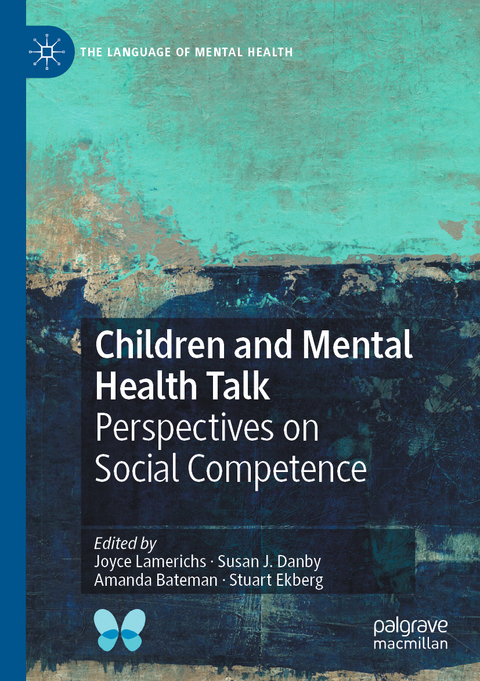
Children and Mental Health Talk
Springer International Publishing (Verlag)
978-3-030-28428-2 (ISBN)
This timely collection explores how children display social competence in talking about their mental health and wellbeing. The authors analyse recorded conversations of young people's interactions with professionals in which they disclose particular mental health concerns and their ways of coping, drawing on insights from ethnomethodology, conversation analysis and discursive psychology. Across a diverse range of institutional and international settings, chapters examine how children and young people employ interactional strategies to demonstrate their competence. The research reveals how young people resist or protect claims that they lack competence, especially in contexts where they might be seen as seeking or asking for support, or when their (dis)abilities and mental health is explicitly up for discussion.
Each chapter concludes with a reflection on the methodological, professional and practical implications of the findings, highlighting areas where future research is necessary and addressing the empirical findings from the authors professional vision, facilitating innovative dialogue between conversation analytic research and professional vision. This book will be of great value to academics and professionals interested in how children express themselves, particularly in relation to their mental wellbeing.
lt;p>Joyce Lamerichs is Assistant Professor at VU University Amsterdam, The Netherlands. Her expertise lies in the area of discursive psychology and conversation analysis, as applied to health settings. She is currently involved in a project funded by the Netherlands Organisation for Health Research and Development that makes use of conversation analysis to examine end-of-life decisions on intensive care units in Dutch University Medical Centers.
Susan J. Danby is Professor in Early Childhood Education and Inclusive Education at Queensland University of Technology, Brisbane, Australia. Her research explores the everyday social and interactional practices of children, showing their complex and competent work as they build their social worlds. She has published in the areas of qualitative research, helpline interaction, home and classroom interaction, early childhood pedagogy, and doctoral education.
Amanda Bateman is Senior Lecturer at Swansea University, UK and has awards in teaching and research at a university and New Zealand national level, has led funded projects investigating early childhood, and published widely including the books Early Childhood Education: The Co-Production of Knowledge and Relationships, and the co-edited Children's Knowledge-in-interaction: Studies in Conversation Analysis.
Stuart Ekberg is Senior Research Fellow at Queensland University of Technology, Australia and specialises in conversation analytic research examining social interaction in a range of clinical contexts. Two current areas of research, both funded by the Australian Research Council, explore psychotherapeutic sessions and paediatric palliative care consultations.
Chapter 1: Professional practices and children's social competence in mental health talk; Danby, Lamerichs, Bateman & Ekberg.- Chapter 2: Testing children's degrees and domains of social competence in child mental health assessments; O'Reilly, Kiyimba & Hutchby.- Chapter 3:Children's competence and wellbeing in sensitive research: when video-stimulated accounts lead to dispute; Theobald and Danby.- Chapter 4: Initiating earthquake talk with young children: Children's social competence and the use of resources; Bateman and Danby.- Chapter 5: "Well I had nothing weird going on": Children's displays of social competence in psychological research interviews; Lamerichs, Alisic & Schasfoort.- Chapter 6: Misleading the alleged offender: child witnesses' displays of competence in police interviews; Jol, Stommel & Spooren.- Chapter 7: The social organization of echolalia in clinical encounters involving a child diagnosed with Autism Spectrum Disorder; Kawashima and Maynard.- Chapter 8: Children's social competence and mental health talk: an epilogue; Osvaldsson Cromdal & Cromdal.
"This collection stands out from the previous studies ... . Overall, the volume is logically well-knit and informatively well-written with a 'research plus practice plus reflection' pattern, which may contribute to the cooperation between researchers and professionals. ... valuable sources and references for researchers, practitioners, policymakers, undergraduates and graduate students ... . In summary, this collection is strongly recommended to be added into the must-read list of child studies." (Wei Zhao, Discourse Studies, Vol. 23 (5), 2021)
"Children and Mental Health Talk is an interesting read, even if the reader is not very familiar with conversation analysis. It takes some time to get used to the transcription of the recorded conversations, but the analysis of the conversations is fascinating to read." (Hennie Weiss, Metapsychology Online Reviews, metapsychology.net, Vol. 24 (36), 2020)
"A valuable addition to literature with a focus on mental health in childhood. ... this book a must-have for academics as well as students in the field of childhood studies and wellbeing." (Wendy Sims-Schouten, International Journal of Emotional Education, Vol. 12 (1), 2020)
| Erscheinungsdatum | 12.01.2021 |
|---|---|
| Reihe/Serie | The Language of Mental Health |
| Zusatzinfo | XXVIII, 216 p. |
| Verlagsort | Cham |
| Sprache | englisch |
| Maße | 148 x 210 mm |
| Gewicht | 323 g |
| Themenwelt | Geisteswissenschaften ► Psychologie ► Entwicklungspsychologie |
| Geisteswissenschaften ► Psychologie ► Pädagogische Psychologie | |
| Medizin / Pharmazie ► Medizinische Fachgebiete ► Psychiatrie / Psychotherapie | |
| Schlagworte | Autism spectrum disorder • childhood sociology • child mental health assessments • Child wellbeing • conselling therapy • conversation analysis • discursive psychology • Ethnomethodology • everyday crises • mental health concerns • Social Interaction • Speech therapy • traumatic events |
| ISBN-10 | 3-030-28428-X / 303028428X |
| ISBN-13 | 978-3-030-28428-2 / 9783030284282 |
| Zustand | Neuware |
| Haben Sie eine Frage zum Produkt? |
aus dem Bereich


